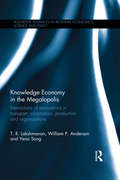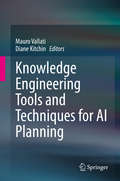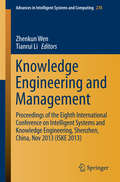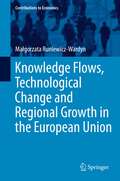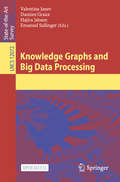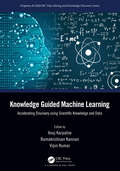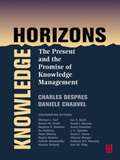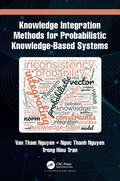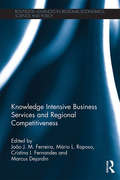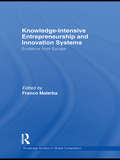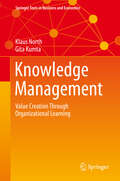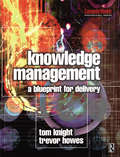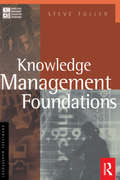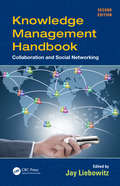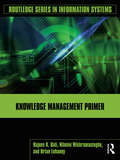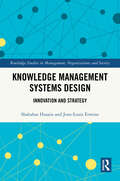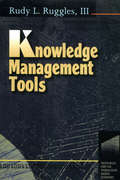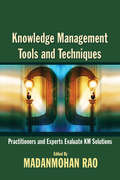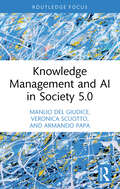- Table View
- List View
Knowledge Economy in the Megalopolis: Interactions of innovations in transport, information, production and organizations (Routledge Advances in Regional Economics, Science and Policy)
by William P. Anderson T. R. Lakshmanan Yena SongIn recent decades urban regions around the world have engaged in a new process of development based on the creation of new knowledge. Amidst the globalization of economic activities and the arrival of transformative technologies, knowledge has become the key driver of competitiveness and is profoundly reshaping the patterns of economic growth and activity. This book offers a comprehensive new model of the rise of a Knowledge Economy and its evolutionary development in the Megalopolis. These regions are developing new institutions and governance mechanisms to adapt, disseminate, and utilize available knowledge to promote continuing development of their Knowledge Economies. However, such developments are accompanied by increasing inequalities in incomes and in urban services. This book examines the resilience of some urban regions and their recent emergence as vibrant Knowledge Economies. It also reviews the recent renewal and growth in the Megalopolis-- stretching along the Atlantic Seaboard along the metropolitan areas of Boston, New York, Philadelphia, Baltimore and Washington DC. This book will appeal to researchers and professionals interested in urban and regional development, and to business groups interested in economic development.
Knowledge Economy, Information Technologies and Growth
by Luigi PaganettoThis volume focuses on the Information and Communication (ICT) revolution and its impact on economic growth. Even though the emergence of the knowledge economy is at the center of attention by media and is often a subject of economic policy debate, economic research on the issue is still relatively underdeveloped and many aspects of it are still awaiting proper theoretical and empirical scrutiny. One important question is whether, as many economists and opinion leaders maintain the knowledge economy and the new information technologies have fostered the birth of a 'new economy' which by inducing a strong productivity growth in most sectors, is behind the impressive growth of GDP experienced by the US economy. Empirical research has in fact been unable to provide a conclusive answer to this question. This book debates this issue and provides the opportunity to discuss the economic and social effects of the ICT revolution. It also focuses on the functioning and the micro-economic structure of the ICT sector, as well as on its impact on various industries, on the financial system and on the labor market. It analyses the role of the ICT revolution on regional development and it addresses important policy issues such as its consequences for antitrust legislation and government regulation.
Knowledge Economy: The Indian Challenge
by Ashoka Chandra M.K. KhanijoKnowledge Economy: The Indian Challenge engages with the challenge of transforming the Indian economy to a knowledge economy. Thus, it looks at change management of the economy with a focus on: • Economic trends and critical activities contributing to the desired change • Educational issues for preparing the human resources • Structural issues for developing institutional frameworks • Societal issues for ultimately benefiting stakeholders
Knowledge Engineering Tools and Techniques for AI Planning
by Mauro Vallati Diane KitchinThis book presents a comprehensive review for Knowledge Engineering tools and techniques that can be used in Artificial Intelligence Planning and Scheduling. KE tools can be used to aid in the acquisition of knowledge and in the construction of domain models, which this book will illustrate. AI planning engines require a domain model which captures knowledge about how a particular domain works - e.g. the objects it contains and the available actions that can be used. However, encoding a planning domain model is not a straightforward task - a domain expert may be needed for their insight into the domain but this information must then be encoded in a suitable representation language. The development of such domain models is both time-consuming and error-prone. Due to these challenges, researchers have developed a number of automated tools and techniques to aid in the capture and representation of knowledge.This book targets researchers and professionals working in knowledge engineering, artificial intelligence and software engineering. Advanced-level students studying AI will also be interested in this book.
Knowledge Engineering and Management
by Tianrui Li Zhenkun Wen"Knowledge Engineering and Management" presents selected papers from the 2013 International Conference on Intelligent Systems and Knowledge Engineering (ISKE2013). The aim of this conference is to bring together experts from different expertise areas to discuss the state-of-the-art in Intelligent Systems and Knowledge Engineering, and to present new research results and perspectives on future development. The topics in this volume include, but not limited to: Knowledge Representation and Modeling, Knowledge Maintenance, Knowledge Elicitation, Knowledge-Based Systems (KBS), Content Management and Knowledge Management Systems, Ontology Engineering, Data Mining and Knowledge Discovery, Knowledge Acquisition, etc. The proceedings are benefit for both researchers and practitioners who want to utilize knowledge engineering methods in their specific research fields. Dr. Zhenkun Wen is a Professor at the College of Computer and Software Engineering, Shenzhen University, China. Dr. Tianrui Li is a Professor at the School of Information Science and Technology, Southwest Jiaotong University, Xi'an, China.
Knowledge Flows in European Industry (Routledge Studies in Business Organizations and Networks #Vol. 35)
by Nicholas S. Vonortas Yannis Caloghirou Anastasia ConstantelouThe channels and mechanisms of knowledge flows define the links that make up production and innovation systems. As such, they relate directly or indirectly to all policies that affect such systems. Knowledge flows are also directly related to intellectual property protection policies and competition policies that create the infrastructure supporting various forms of formal interaction among economic agents in production and innovation systems. Knowledge Flows in European Industry presents the results of an extensive research programme funded by the European Commission to empirically appraise the dissemination of knowledge relevant to the innovative activities of European manufacturing and service sectors. It explores the extent, density, and mechanism of innovation-related knowledge flows affecting the innovative capacity of European industry and the mechanisms that support such flows, as well as examining incentives to access and transmit results and the determinants of knowledge transmission. Featuring contributions from leading international scholars including Anthony Arundel and Bent Dalum, this interdisciplinary volume focuses on questions of interest to regional, national, and pan-European science, technology and innovation policy, and will be an important read for those involved in business and management as well as those in the field of economics.
Knowledge Flows, Technological Change and Regional Growth in the European Union
by Małgorzata Runiewicz-WardynThe book provides conceptual and empirical insights into the complex relationship between knowledge flows and regional growth in the EU. The author critically scrutinizes and enhances the RIS (Regional Innovation System) approach, discussing innovation as a technological, institutional and evolutionary process. Moreover, she advances the ongoing discourse on the role of space and technological proximity in the process of innovation and technological externalities. The book closes with an investigation of the role of technological change and knowledge spillovers in the dynamic growth and "catching-up" of EU regions.
Knowledge Generation and Protection
by Jorge Mario Martínez-PivaThe wealth of the most developed nations, and, to a large extent their economic growth, can be explained by the capacities to generate research, create knowledge, appropriate it and transform it into new technologies. The study of the dynamics and contemporary mechanisms for the circulation, access, and commercial application of knowledge is an urgent task, since the capabilities related to technological change appear increasingly to be the path for developing countries to move away from their condition on the periphery. Knowledge Generation and Protection, showcasing research from academics, policymakers, and consultants, offers an analysis of three fundamental topics. The first is whether strengthening protection of intellectual property encourages or hinders technological learning and innovation in the developing countries. The second addresses the way in which knowledge is generated and how it is transformed into useful technology for the market, that is, how national innovation systems work. The third is the role of public policy as an instrument for innovation and for regulating intellectual property. Chapters explore the relationships among intellectual property, innovation, economic development, and policy in depth, with particular attention to such emerging topics as the impact of trade agreements on intellectual property rights and sensitive issues for developing countries such as access to medicines, and protection of biological diversity, living organisms, and traditional knowledge. Several chapters focus on Mexico, which serves as an important example as the only developing nation that is a member of OECD and has a rich history of industrial policy, science and technology policy, and trade openness. The concluding chapter argues that if developing countries seek to develop dynamic competitiveness based on knowledge and innovation in the present context of rigorous intellectual property regulations, they should take a leap in their science and technology policies to take advantage of the growing world market and open up long-term development paths.
Knowledge Graphs and Big Data Processing (Lecture Notes in Computer Science #12072)
by Valentina Janev Damien Graux Hajira Jabeen Emanuel SallingerThis open access book is part of the LAMBDA Project (Learning, Applying, Multiplying Big Data Analytics), funded by the European Union, GA No. 809965. Data Analytics involves applying algorithmic processes to derive insights. Nowadays it is used in many industries to allow organizations and companies to make better decisions as well as to verify or disprove existing theories or models. The term data analytics is often used interchangeably with intelligence, statistics, reasoning, data mining, knowledge discovery, and others. The goal of this book is to introduce some of the definitions, methods, tools, frameworks, and solutions for big data processing, starting from the process of information extraction and knowledge representation, via knowledge processing and analytics to visualization, sense-making, and practical applications. Each chapter in this book addresses some pertinent aspect of the data processing chain, with a specific focus on understanding Enterprise Knowledge Graphs, Semantic Big Data Architectures, and Smart Data Analytics solutions. This book is addressed to graduate students from technical disciplines, to professional audiences following continuous education short courses, and to researchers from diverse areas following self-study courses. Basic skills in computer science, mathematics, and statistics are required.
Knowledge Guided Machine Learning: Accelerating Discovery using Scientific Knowledge and Data (Chapman & Hall/CRC Data Mining and Knowledge Discovery Series)
by Vipin Kumar Anuj Karpatne Ramakrishnan KannanGiven their tremendous success in commercial applications, machine learning (ML) models are increasingly being considered as alternatives to science-based models in many disciplines. Yet, these "black-box" ML models have found limited success due to their inability to work well in the presence of limited training data and generalize to unseen scenarios. As a result, there is a growing interest in the scientific community on creating a new generation of methods that integrate scientific knowledge in ML frameworks. This emerging field, called scientific knowledge-guided ML (KGML), seeks a distinct departure from existing "data-only" or "scientific knowledge-only" methods to use knowledge and data at an equal footing. Indeed, KGML involves diverse scientific and ML communities, where researchers and practitioners from various backgrounds and application domains are continually adding richness to the problem formulations and research methods in this emerging field. Knowledge Guided Machine Learning: Accelerating Discovery using Scientific Knowledge and Data provides an introduction to this rapidly growing field by discussing some of the common themes of research in KGML using illustrative examples, case studies, and reviews from diverse application domains and research communities as book chapters by leading researchers. KEY FEATURES First-of-its-kind book in an emerging area of research that is gaining widespread attention in the scientific and data science fields Accessible to a broad audience in data science and scientific and engineering fields Provides a coherent organizational structure to the problem formulations and research methods in the emerging field of KGML using illustrative examples from diverse application domains Contains chapters by leading researchers, which illustrate the cutting-edge research trends, opportunities, and challenges in KGML research from multiple perspectives Enables cross-pollination of KGML problem formulations and research methods across disciplines Highlights critical gaps that require further investigation by the broader community of researchers and practitioners to realize the full potential of KGML
Knowledge Horizons
by Daniele Chauvel Charles DespresKnowledge Horizons charts the feasible future for knowledge management. This practical and provocative resource presents the work of many of the leading voices in knowledge management and related disciplines, who explore the current trends and offer pragmatic and authoritative thinking on applied knowledge management from a variety of positions. Knowledge management is the new frontier for businesses, organizations, and institutions of all kinds. For those that hope to conquer this new territory, establishing a better understanding of current and future knowledge management trends and adoption of the most effective practices is imperitive. There are numerous options for executives: intranets, extranets, groupware, and core competencies are continually being refined. New entitites and rules in terms of intellectual capital and the "Chief Knowledge Officer" are emerging. Knowledge Horizons addresses these issues by exploring current and future knowledge management trends, gauging the future value of knowledge management investments, and how they will drive new business initiatives, and integrates the experience and insights of managers and cutting-edge research from experts in the field.
Knowledge Infrastructure and Higher Education in India (Routledge Focus on Economics and Finance)
by Kaushalesh Lal Shampa PaulThis short book examines the availability and adoption of new education technologies in higher education institutions in India. It provides a summary of the activities in which such technologies are being used and the catalytic factors for such adoptions. The book also evaluates the impact on skill development, and will be a useful reference for those who are interested to find out more about technology adoption and implementation in higher education, and what the challenges are through the learning experiences in these education institutions.
Knowledge Integration Methods for Probabilistic Knowledge-based Systems
by Ngoc Thanh Nguyen Van Tham Nguyen Trong Hieu TranKnowledge-based systems and solving knowledge integrating problems have seen a great surge of research activity in recent years. Knowledge Integration Methods provides a wide snapshot of building knowledge-based systems, inconsistency measures, methods for handling consistency, and methods for integrating knowledge bases. The book also provides the mathematical background to solving problems of restoring consistency and integrating probabilistic knowledge bases in the integrating process. The research results presented in the book can be applied in decision support systems, semantic web systems, multimedia information retrieval systems, medical imaging systems, cooperative information systems, and more. This text will be useful for computer science graduates and PhD students, in addition to researchers and readers working on knowledge management and ontology interpretation.
Knowledge Intensive Business Services and Regional Competitiveness (Routledge Advances in Regional Economics, Science and Policy)
by Marcus Dejardin João J. Ferreira Mário L. Raposo Cristina I. FernandesResearch interest in the service sector has boomed in recent years as deindustrialisation became entrenched. Instead of being regarded as merely supplementary to traditional industry and manufacturing, services have generated progressively rising levels of growth in developed economies while at the same time coming to be recognised as major drivers of innovation. Among the factors which have helped service companies notch up swifter growth rates than all other sectors are the outsourcing of such services by other sectors, including the development of information and communication technologies, and changes to the regulatory, legal and market frameworks as well as globalisation and internationalisation. The result is a cluster of highly innovative firms which can loosely be grouped under the heading of Knowledge Intensive Business Services (KIBS). Knowledge Intensive Business Services and Regional Competitiveness charts the development of these firms and explores their success through four mutually linked parts: KIBS and industrial dynamics; KIBS and their context; KIBS and their contribution to regional competitiveness and economic development; and finally, KIBS and public policy. This book is suitable for researchers and policy makers interested in the rise of these influential actors and their influence on regional competitiveness.
Knowledge Intensive Entrepreneurship and Innovation Systems: Evidence from Europe (Routledge Studies In Global Competition Ser.)
by Franco MalerbaThis book examines entrepreneurship from three interrelated perspectives. Firstly, it links entrepreneurship to innovation and to the generation, transformation and use of knowledge. Secondly, it inserts entrepreneurship in innovation systems of various types- national, sectoral and local. Thirdly, it views entrepreneurship not as a single event but as a process that evolves in time, from the pre-entry experience, to the entrepreneurial act, to the evolution of the entrepreneur and the new company. With chapters from a range of international contributors, the book answers questions such as; what are the main dimensions of knowledge intensive entrepreneurship? What are the factors affecting its emergence, evolution and performance? How important is knowledge intensive entrepreneurship for European growth and competitiveness? Is the situation of Central and Eastern Europe, engaged in a process of major economic and institutional transformation, similar or different from the one of Western Europe?
Knowledge Leadership: The Art And Science Of The Knowledge-based Organization
by Sharon Seivert Steven A. CavaleriIn Knowledge Leadership, Cavaleri and Seivert describe the dawning of a new era in which individuals are “leading” rather than “managing” knowledge. In the past, many knowledge-based initiatives have failed because leaders underestimated the powerful link between knowledge and performance improvement – and also because they mistakenly thought that “information” was the same as knowledge. Cavaleri and Seivert claim that, while information is a necessary precursor to knowledge, it is not sufficient in itself for improving business performance. The authors describe notable organizations that use the pragmatic knowledge strategies they describe to gain competitive advantage. Pragmatic knowledge is the result of individuals’ developing a deeper understanding of how (and why) things work best in practice. The process of creating pragmatic knowledge transforms key lessons from systems thinking, total quality management, and organization learning into a powerful new business strategy.To help readers apply the concepts and tools in this book, Cavaleri and Seivert draw on case examples and a decade of original cross-cultural research about knowledge leadership. They also invite readers to use The Knowledge Bias Profile to discover their knowledge leadership style. The book systematically outlines a user-friendly strategy for becoming a knowledge leader and for building high-performing, knowledge-based organizations.
Knowledge Management
by Klaus North Gita KumtaThis textbook on Knowledge Management is a result of more than twenty years of research, teaching and consulting experience of the authors. This is the first comprehensive text which brings together European, Asian and American perspectives on knowledge-based value creation. This book is intended not only for academic education but also for providing guidance to managers, consultants, trainers, coaches and those interested to learn about organizations in a knowledge economy in business, public administration and non-profit organizations. Many case studies, examples, questions, assignments as well as easy to use knowledge management tools make this work a compendium for learning, and for implementing knowledge management initiatives.
Knowledge Management - A Blueprint for Delivery
by Tom Knight Trevor HowesWe are now in the 'third wave' of Knowledge Management - the first was focused on the potential of new technology, while the second focused on the nature of knowledge and how people 'know' and learn. The focus in the third phase is two-fold: building individual and team productivity, and proper alignment of Knowledge Management efforts in helping deliver on strategic goals of the organization.Knowledge Management- a Blueprint for Delivery explores and builds on current ideas about the dynamics of knowledge in organizations, answering such questions as: 'What is knowledge management?' and 'What does it mean for today's companies and organizations?' Written by two leading knowledge management practitioners, this book looks beyond academic theory and software company hype to focus on the roles that knowledge and information play in creating high-performance organizations. Built on their extensive experience of Knowledge Management programme design and delivery, Knowledge Management- a Blueprint for Delivery:contains a comprehensive survey of the whole area of Knowledge Management, from theory and strategy creation through to techniques, tools, and delivery of changeprovides an insight into developing and managing Knowledge Management initiativesbridges the gap between theoretical, strategic, and practical hands-on perspectives
Knowledge Management Foundations
by Steve Fuller'Knowledge Management Foundations' is just what it claims, the first attempt to provide a secure intellectual footing for the myriad of practices called "knowledge management." A breath of fresh air from the usual KM gurus, Fuller openly admits that the advent of KM is a mixed blessing that often amounts to the conduct of traditional management by subtler means. However, Fuller's deep understanding of both the history of management theory and knowledge production more generally enables him to separate the wheat from the chaff of the KM literature. This ground-breaking book will prove of interest to both academics and practitioners of knowledge management. It highlights the ways in which KM has challenged the values associated with knowledge that academics have taken for granted for centuries. At the same time, Fuller resists the conclusion of many KM gurus, that the value of knowledge lies in whatever the market will bear in the short term. He pays special attention to how information technology has not only facilitated knowledge work but also has radically altered its nature. There are chapters devoted to the revolution in intellectual property and an evaluation of peer review as a quality control mechanism. The book culminates in a positive re-evaluation of universities as knowledge producing institutions from which the corporate sector still has much to learn.
Knowledge Management Handbook: Collaboration and Social Networking, Second Edition
by Jay LiebowitzRecent research shows that collaboration and social networking foster knowledge sharing and innovation by sparking new connections, ideas, and practices. Yet these informal networks are often misunderstood and poorly managed. Building on the groundbreaking, bestselling first edition, Knowledge Management Handbook: Collaboration and Social Networkin
Knowledge Management Primer
by Nilmini Wickramasinghe Rajeev K. Bali Brian LehaneyThe discipline of Knowledge Management (KM) is rapidly becoming established as an essential course or module in both information systems and management programs around the world. Many KM texts pitch theoretical issues at too technical or high a level, or presenting a only a theoretical prescriptive treatment of knowledge or KM modeling problems. The Knowledge Management Primer provides students with an essential understanding of KM approaches by examining the purpose and nature of its key components. The book demystifies the KM field by explaining in a precise, accessible manner the key concepts of KM tools, strategies, and techniques, and their benefits to contemporary organizations. Readers will find this book filled with approaches to managing and developing KM that are underpinned by theory and research, are integrative in nature, and address softer approaches in manifesting and recognizing knowledge.
Knowledge Management Systems Design: Innovation and Strategy (Routledge Studies in Management, Organizations and Society)
by Shabahat Husain Jean-Louis ErmineKnowledge Capital, vital for organizations' sustainability, competitiveness, and stability, can be regenerated in a value-added manner, enabling the development of high-quality products and services through innovative Knowledge Management (KM) techniques. One effective approach is establishing and implementing ISO-compliant Knowledge Management Systems (KMS) across various sectors.Covering nearly all aspects of Knowledge Management, this book offers a comprehensive overview of the evolution and description of core theories, along with their applications in a few case studies that thoroughly analyze the necessary procedures and technologies for developing KMS. The book encompasses the latest trends showcasing the increasing integration of artificial intelligence techniques within KM practices, as discernible through scores of service providers. Additionally, it addresses the challenges of measuring the effectiveness of KM techniques and the value they bring to organizations, thereby supporting the successful and sustainable implementation of KM. It also highlights innovative frameworks such as the Virtuous KM Cycle, MASK techniques, the Daisy Model, and the Husain-Ermine AI-KM Model.The publication is an essential resource for students and researchers specializing in Knowledge Management, as well as for managers, academicians, and practitioners in both the public and private sectors.
Knowledge Management Tools
by Rudy RugglesThe third in the readers series Resources for the Knowledge-Based Economy, Knowledge Management Tools analyzes the use of knowledge management tools in the past, present and future. It helps managers and companies utilize what they know. The selections in this volume were carefully chosen to represent the strengths and weaknesses, and pros and cons of using technology to support knowledge-based activities. They acknowledge that, although tools alone are not the answer to the difficult questions surrounding knowledge management, if utilized effectively tools can open up new realms of innovation and efficiency for today's knowledge-driven businesses.
Knowledge Management Tools and Techniques: Practitioners And Experts Evaluate Km Solutions
by Madanmohan RaoKnowledge management (KM) - or the practice of using information and collaboration technologies and processes to capture organizational learning and thereby improve business performance - is becoming one of the key disciplines in management, especially in large companies. Many books, magazines, conferences, vendors, consultancies, Web sites, online communities and email lists have been formed around this concept.This practical book focuses on the vast offerings of KM solutions—technology, content, and services. The focus is not on technology details, but on how KM and IT practitioners actually use KM tools and techniques. Over twenty case studies describe the real story of choosing and implementing various KM tools and techniques, and experts analyse the trends in the evolution of these technologies and tools, along with opportunities and challenges facing companies harnessing them. Lessons from successes and failures are drawn, along with roadmaps for companies beginning or expanding their KM practice. The introductory chapter presents a taxonomy of KM tools, identifies IT implications of KM practices, highlights lessons learned, and provides tips and recommendations for companies using these tools. Relevant literature on KM practices and key findings of market research groups and industry consortia such as IDC, Gartner and APQC, are presented.The majority of the book is devoted to case studies, featuring clients and vendors along the entire spectrum of solutions: hardware (e.g. handheld/wearable devices), software (e.g. analytics, collaboration, document management) and content (e.g. newsfeeds, market research). Each chapter is structured along the "8Cs" framework developed by the author: connectivity, content, community, commerce, community, capacity, culture, cooperation and capital. In other words, each chapter addresses how appropriate KM tools and technologies help a company on specific fronts such as fostering adequate employee access to knowledge bodies, user-friendly work-oriented content, communities of practice, a culture of knowledge, learning capacity, a spirit of cooperation, commercial and other incentives, and carefully measured capital investments and returns. Vendor history, product/service offerings, implementation details, client testimonials, ROI reports, and future trends are highlighted.Experts in the field then provide third-party analysis on trends in KM tools and technique areas, and recommendations for KM practitioners.
Knowledge Management and AI in Society 5.0 (Routledge Focus on Business and Management)
by Manlio Del Giudice Veronica Scuotto Armando PapaSociety 5.0 points toward a human-centred approach by the use of modern, advanced technologies and artificial intelligence. This book explores and offers an overview of knowledge management embraced in the current scenario of Society 5.0, shedding light on its importance in a society that is increasingly digital and interconnected. The book enhances current managerial and economic research by offering the “human” side of knowledge management (KM) intertwined with the use of artificial intelligences (AIs). Each chapter explores KM from different perspectives, including entrepreneurship, innovation, marketing, and strategy, in a theoretical and practical way. They include insights from both practitioners and scholars, enriched by practical tools that can be used during laboratories, workshops and tutorials. The book presents evidence on how to manage KM and develop new knowledge in different subjects, with the aim of overcoming conventional KM strategy and show how business and society are connected with “power of subjective human knowledge creation”. Offering both new insights, research and practical guidance, this book will appeal to academics and students of knowledge management as well as digital transformation practitioners looking for ways to transition their organizations from knowledge economy to digital economy.
